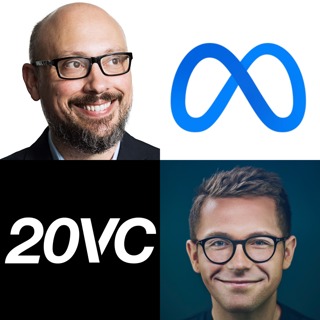
20VC: Meta CMO Alex Schultz on The Crucible Moments Scaling Facebook to 1BN Users, Turning Facebook Reels Into a Monetisation Engine, Competing Against TikTok and SNAP, Coming Out in the World of Tech; The Challenges and What Needs to Change
Alex Schultz is the Chief Marketing Officer and VP of Analytics for Meta (formerly Facebook), leading Marketing, Analytics, and Internationalization. Previously, Mark Zuckerberg stood up and said, "Facebook would not be a BN user company without Alex". At Meta, Alex has pioneered the integration of product and direct response marketing at Meta and helped launch many of the company's most impactful products and initiatives. Alex is gay and is the executive sponsor of Facebook's LGBTQ+ Employee Resource Group. In Today's Episode with Alex Schultz We Discuss: 1. From Paper Planes to CMO of Facebook: How Alex started his career in the world of paper planes and how that led to his getting a role at an early eBay? What are 1-2 of his biggest lessons from eBay? How did the role at Facebook come about in 2008? Why did he decide to join the early Facebook? What does Alex know now that he wishes he had known when he started his time at Facebook? 2. The Secret to Scaling to 1 Billion Users: Mark Zuckerberg has said that "Facebook would not be a billion-user company without Alex". So what does Alex believe are the 1-2 biggest needle movers in FB scaling to 1 billion users? Why does Alex believe that the best leaders are patiently right? How can management be direct and effective but also show they care and be kind? What have been some of Alex's biggest lessons on people management across different phases of the company? 3. Crucible Moments in Facebook History: Facebook Messenger Split: What was the decision-making process behind splitting Messenger from the core Facebook App? What did they do right and well in the split? What mistakes were made? Rebrand to Meta: Why did Facebook decide it was right to rebrand to Meta? Has the rebrand gone well? How does Alex define success with the rebrand? Reels vs TikTok vs SNAP: Does Alex believe we are moving away from the social graph and moving to content discovery only? How does Alex feel Reels is doing in the race against TikTok? What have they done well? Why does Alex believe SNAP hasn't innovated in the way people think and copied Kakao in cases? What is the key to turning Reels into a monetization machine for Facebook? 4. Alex Schultz: The Person and Leader: How was the coming out process for Alex in the tech community? How did his parents respond to the news? What does Alex mean when he says, "everyone has to mourn their own version of your future self"? Why when he moved to the states was Alex advised to go back in the closet? Does Alex feel we have a long way to go in equalizing the playing field both for homosexuality and trans-gender participation?
6 Mars 202349min
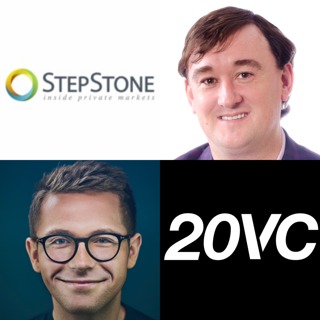
20VC: Will LPs Pull Out of Existing Managers, How Will Fund Sizes Change Moving Forward, Is Now The Time to be Aggressive on Secondaries, What is the Discount on Secondaries Today, Who Will Win and Lose in the Next Five Years with Hunter Somerville, Partn
Hunter Somerville is a Partner @ Stepstone, one of the largest secondary buyers, fund investors and players in our ecosystem with over $600BN in capital responsibility and over $100BN AUM. Additionally, Hunter serves on the LP Advisory Boards for Felix Capital, Foundry Group, Imaginary Ventures, Scale Venture Partners, Boldstart Ventures, Ludlow Ventures, and more. Prior to StepStone, Hunter was a general partner with Greenspring Associates, a venture capital and growth equity investment firm that merged with StepStone in 2021. Before that, he worked as an associate for Camden Private Capital. In Todays Episode with Hunter Somerville We Discuss: 1. Three Types of Secondaries: What are the three different types of secondaries? What is the current situation with company secondary opportunities today? What is the current landscape for fund secondary opportunities today? What are GP-led restructuring or strip sales? How do they work? 2. LPs Today and Moving Forward Investing in Funds: Will we see a wave of LPs not commit to their existing managers? What is the denominator effect and how does that impact LP deployment into funds? What are the top 3 reasons why LPs will not re-commit to existing managers? Do LPs feel VCs have fairly marked down their venture books in the last 6 months? Does Hunter agree that if you have not returned cash to your LPs when you could have done ijn the last 5 years, then you are most in trouble? Why does Hunter believe we will see more international LPs entering venture than ever before? 3. Liquidity: When Does the Cash Hit: Why was liquidity so bad in 2022? How did that compare to 2021? How does Hunter forecast liquidity environments in 2023? What could drive them? How active were Stepstone in secondary buying over the last few years? Is now the time to be greedy when others are fearful in secondaries? What discount was Hunter seeing both on fund and company side secondaries in 20-22? What is the current level of discount being applied to both company and fund secondaries? 4. AMA with One of the Largest Secondary Buyers: Which LP class will be hurt the most from the last fund cycle? What would Hunter most like to change about the world of venture? What was Hunter's biggest mistake on a company investment? What are the biggest mistakes LPs make when they do direct investing? Why are big-name people entering firms as GPs not always a good sign?
3 Mars 202351min

20VC: The Story of Ring: Scaling from an Idea in a Garage to Richard Branson Investing and a Reported $1BN Amazon Acquisition | Why Building a Brand is Like Making Great Wine | The Secret to Hiring Success; Hire Marathoners and more with Jamie Siminoff
Jamie Siminoff is the Founder and Chief Inventor @ Ring, with Ring Jamie, created the world's first Wi-Fi video doorbell while working in his garage in 2011. Since Ring's launch in 2013, Ring has helped make thousands of neighborhoods safer all around the world. As part of the journey, Jamie raised over $385M from the likes of True Ventures, Felicis, First Round, CRV, Upfront and more. In 2018, Amazon acquired Ring for a reported $1BN. Prior to Ring, Jamie founded several successful ventures including PhoneTag, the world's first voicemail-to-text company, and Unsubscribe.com, a service that helped email users clean commercial email from their inboxes. He successfully sold both companies in 2009 and 2011 respectively. In Today's Episode with Jamie Siminoff We Discuss: 1.) From Creating the First Wi-Fi Doorbell to $BN Acquisition: When was the moment Jamie realized he had to create the world's first Wi-Fi-enabled doorbell? How di Richard Branson come to be an investor in Ring? What was the process? How does Jamie advise other founders when it comes to the question of whether it is valuable having business moguls as investors in their business? 2.) Crucible Moments: From Lawsuits and Near-Death to $22M in Sales in a Day: When Jamie hears the words "near-death experience" what is the moment in the Ring journey that comes to mind? How did Jamie get through a crippling lawsuit and come out selling $22M in 24 hours on QVC? How did Jamie feel when he placed a $500M order with manufacturers when he only had $100M? What does Jamie believe was the hardest phase of the business? 3.) Jamie Siminoff: The Leader: Why does Jamie want to hire marathon runners? Why does the analogy make for good hires? Does Jamie start from a position of trust with new hires and it is there to be built or start with no trust and it is there to be gained? Does Jamie believe he is a tolerant leader? What does he mean when he says, "I want to see the dirt under your fingernails"? Why does Jamie believe that building a brand is like making great wine? Why does Jamie really hate customer surveys? What should be done instead? 4.) Selling for $1BN to Amazon: How did the Amazon acquisition come to be? How did the discussion go? Why did Jamie decide then was the right time? When you sell for a $1BN, does the cash hit your account soon? When did Jamie actually receive the money? How did he feel when he saw it is in his account? What does Jamie believe Ring did so well to make the acquisition a success? What did Amazon do well to ensure Ring was integrated most effectively? What are 1-2 of the biggest lessons Jamie has learned from being within Amazon?
1 Mars 202357min
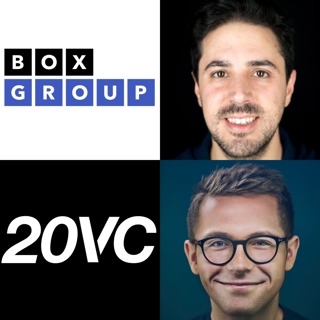
20VC: How Multi-Stage Funds Changed The Game For Seed Rounds, Why Signalling Risk is BS, The Three Most Important Variables for Founders When Raising Rounds & A Debate on Portfolio Construction: Does Ownership Matter with David Tisch
David Tisch is the Managing Partner of BoxGroup, one of the leading seed-stage investment firms of the last decade having invested in over 500 seed-stage startups, including Plaid, Ro, Ramp, PillPack, Amplitude, Flatiron Health, Stripe, Warby Parker, Harry's, Oscar, Flexport, Classpass, Vine, GroupMe, Airtable and more. David is also the Chairman of GoodDog, a marketplace to find pets online. In Today's Episode with David Tisch We Discuss: 1.) From Techstars To Founding BoxGroup: How did David start his own firm in the form of Box having started at Techstars? What advice from Brad Feld does David always remember and hold close? What does David know now that he wishes he had known when started investing? 2.) The Debate: The Math Does Not Work: Portfolio Construction: Ownership Does not Matter: How does David justify writing $100K checks from a $127.5M early-stage fund? Even if it is a home run, it does not make a difference to the fund? Level of Diversification: If David is writing small checks like this, with his fund size he will have hundreds of companies, what does David believe is the right level of diversification? Reserves management: How does David think about the ratio of initial to reserves when deploying the funds today? How does reserves management change in a recession? How does David prevent other VCs from using this to try and push him down to always writing a $100K check? Why does David believe that the size of check he is able to invest is the VC's problem and not the founders? Price Sensitivity: How does David assess his own relationship to price today? Why does he believe that company valuation is not something that the investor controls? 3.) Advice to Founders Raising Rounds: What does David believe is the #1 role of the CEO? What are the three most important variables for founders to focus on when raising their round? How should founders analyze the tradeoff between the brand of the VC and the size of the round? Does signaling really make a difference when a large fund invests at seed? How did multi-stage funds change the seed landscape forever with a new product? Who does David believe are the tourists in early-stage venture? Will they leave in the recession? 4.) David Tisch: AMA: Why does David believe that consumer social is not fun anymore? Who when they send him a deal does David take it most seriously? How does David want to ensure that bad VC behaviour is exposed? What would David most like to change about the venture landscape today?
27 Feb 20231h 1min
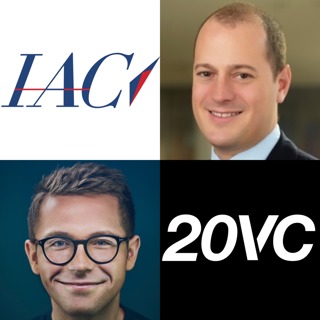
20VC: Why Value Investing is BS, The Most Insane Elements of SPACs, Why Simplification is the Secret to High Margins & Why Good Values Should Make You Uncomfortable with Joey Levin, CEO @ IAC
Joey Levin is the CEO of IAC where he has overseen the constant evolution of the company, including the initial IPO and subsequent spin-off of Match Group, the spin-off of Vimeo, and the acquisitions of Angie's List and Care.com. If that was not enough, in October 2022, Joey was also appointed as CEO of Angi Inc. In addition to this, Joey also serves on the boards of IAC, Turo, and MGM Resorts International. In Today's Discussion with Joey Levin We Discuss: 1.) The Makings of a Great Leader: When Joey was younger, what did he want to be when he grew up? What is Joey's biggest advice to people coming out of college/university at this time? What 1-2 things does Joey credit his internal and fast rise in IAC to? 2) Value Investing is BS & The Markets Today: Why does Joey believe the idea of "value investing" is BS? What 1-2 behavior traits of investors in the last few years were most dangerous? Why does Joey believe that the current market is reasonable and now is the new normal? How does Joey keep internal morale high when people have become accustomed to high stock prices? Does Joey believe in the statement, "be greedy when others are fearful and fearful when others are greedy"? 3.) Simplification is the Secret to Margin & Messaging 101: Why does Joey believe simplification is the core of high margins? How can startups and scale-ups identify where to simplify first? What are the subsequent steps? Why does Joey believe that the best values should make you feel uncomfortable? What is a lesson from Joey's father on what makes truly great messaging? 4.) Parenting, Money and Marriage: How does Joey reflect on his own relationship to money today? What are 1-2 lessons taught by his mother on how to approach money and wealth? What does Joey believe is the secret to truly happy marriages? What are Joey's biggest lessons on what it takes to be an effective and good father?
24 Feb 202337min
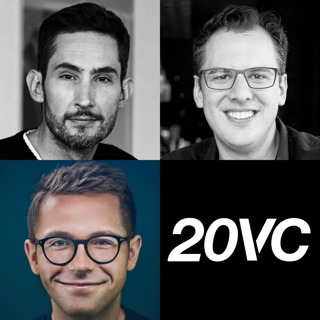
20VC: Instagram Founders Kevin Systrom and Mike Krieger on Why Social Networks Should Be Less Social & The Next Wave of Social | Why San Francisco Will Return with a Vengeance and The Future For Remote Work | Let's Get Personal: Relationships to Money, Be
Kevin Systrom and Mike Krieger are the co-founders of Instagram. Since its release in 2010, Instagram has become of the most significant products in modern society shaping the way millions of people engage with the world around them. In January this year, Kevin and Mike announced their return to the founding arena with the launch of Artifact, a personalized news feed driven by artificial intelligence. In Today's Show with Kevin Systrom and Mike Krieger We Discuss: 1.) The Perfect Partnership: Question from Josh Kushner @ Thrive: What makes Kevin and Mike such a great partnership? What was the last disagreement they had? How was it resolved? They built Instagram in person, in an office. They are building Artifact remotely, what has changed in the way they operate when comparing remote to in-person? 2.) Why Social Networks are Broken & The Next Frontier: Why does Kevin believe social networks today are broken and should be less social? What fundamental premise are social networks built on that Kevin believes is wrong? How will AI and machine learning be central in the next wave of social? How do Kevin and Mike evaluate TikTok and the next wave of content discovery? 3.) Welcome Artifact: The Comeback: Why does Kevin believe they chose the worst idea for their new company? Why is it? Were they nervous about founding Artifact and expectations being so high given Instagram? Why does Kevin argue that Artifact is not actually a "news app"? What does Kevin believe is the biggest lesson Apple taught us about messaging? 4.) Family, Money, San Francisco: Why does Kevin believe that SF will return as the centre of tech once again? Why does Kevin believe that many millennials in the workforce today are entitled and soft? How has becoming a father changed the way Kevin and Mike operate and execute? How do Kevin and Mike assess their relationship with money today? How has it changed? 5.) Hiring, Investing, Managing: What are some of Kevin and Mike's biggest lessons when it comes to hiring? What are the single biggest hiring mistakes they have made? Is it wrong to not hire someone because they are really really boring? What are the biggest lessons for Kevin and Mike from their angel investing?
22 Feb 20231h 4min
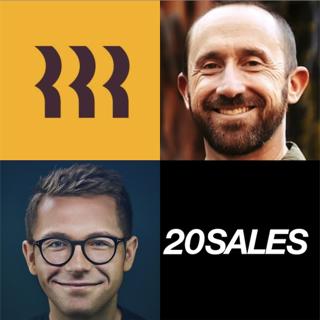
20Sales: What is Sales Engineering? When and How to Hire Them? How They Should Work With AE's? How to Measure Their Success? How They Change Close Rates and Sales Comp Plans with Zach Lawryk, Head of Solutions Consulting @ Rippling
Zach Lawryk is Head of Solutions Consulting @ Rippling, what is solutions consulting? They are the product expert in the solution that ties a business value to help support the sales rep in the execution of their quota. And there is no one better than Zach, prior to leading the solutions consulting team at Rippling, Zach was VP of Solutions Consulting at Slack where he scaled the SE team from 10 to 200. Before Slack, Zach was Head of Solutions Engineering @ Optimizely and before that was Director of Sales Engineering at Box. In Today's Episode with Zach Lawryk We Discuss: 1. ) WTF is Solutions Engineering: What is Solutions engineering and why is it important? How does a software developer turned lawyer become one of the OGs of Solutions Engineering? What is the single biggest piece of advice Zach gives to graduates entering the workforce today? 2.) When and Who: Building the Foundations: When is the right time to hire your first solutions engineer? Should this be a senior hire or a more junior hire? What experience is ideal? Would Zach rather have someone who has sold to the same customer segment or sold to the same deal size? What are the challenges with each? 3.) Making the First Hire: The Process: What is the right hiring process for solutions engineers? Which members of your existing team should be involved in the process? What are some of Zach's favourite questions on the candidates past to determine quality? What are the best case studies and tests to give potential hires to test their aptitude? What are the biggest red flags in the hiring process for solutions engineers? 4.) Integrating into the Team: Making it Work: What is the optimal onboarding process for solutions engineers? Why does Zach think it is important they spend time with customer success in their first month? What is the right way to measure the effectiveness of SE's? How should the entrance of SE's impact the close rate and comp structure for AE's? How can sales leaders prevent division and friction between AEs and SEs?
20 Feb 202334min
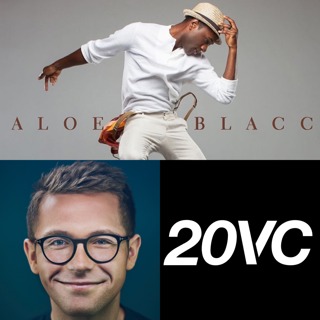
20VC: Grammy Nominee Aloe Blacc on Working with Avicii on "Wake Me Up", The Art of Great Storytelling, Behind The Scenes on the Songwriting Process and Why Rules Are Just "Good Suggestions"
Aloe Blacc is a GRAMMY nominee and the voice behind such hits as Wake Me Up, The Man, SOS, I Need A Dollar, and many more. Aloe has toured the world, won countless awards but his latest album, All Love Everything, is the singer-songwriter's first collection of material written as a father. "Becoming a father made me want to share those experiences in music," he says, admitting it's a challenge to translate such a powerful thing into lyrics and melody. If that was not enough, Aloe is also an entrepreneur with the founding of his new company, something we discuss in the show today. In Today's Discussion with Aloe Blacc: 1.) Entry into Music and Running From Fame: How Aloe first fell in love with music and made his foray into the world of music from Ernst & Young? Why does Aloe believe he is running from fame? What does it bring that he does not like? What does Aloe believe he is running towards? How has this changed? 2.) The Art of Storytelling: How does Aloe think about what it takes to be truly great at storytelling? What is the difference between a great vs an average story? How has his style of storytelling changed over time? What are the biggest mistakes that people make in storytelling? 3.) The Songwriting Process 101: What is Aloe's process for writing new songs? How does he take an idea and expand it, test it and execute against it? How did "Wake Me Up" with Avicci come about? What was the creation process there? What was it like working with Avicci? What did Aloe learn from him about being liked? 4.) Marriage, Fatherhood, and Global Stardom: What does Aloe believe is the key to truly successful marriages? How does Aloe retain a sense of romance with intense work pressures? How has becoming a father changed the way in which Aloe thinks and operates? What is Aloe's love language? How has doing this with his wife changed their relationship?
17 Feb 202348min






















